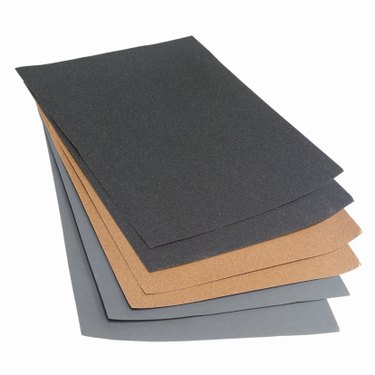Things You'll Need
Water-based soap
Coarse plastic brush
Rags
Towels
180-grit sandpaper
Masking paper
Professional painter's tape
Latex primer
2- to 3-inch polyester paintbrush
Latex paint
Acrylic latex paint

Many amateur painters attempt to paint all surfaces in the same manner, because they don't understand the importance of adhesion. Unlike wood, which is a porous surface, plastic is ill-suited for paint and will reject new finishes unless it is properly conditioned. If you are planning to paint the plastic trim on your door, employ the proper prep strategy, or it will inevitably reject its new finish. Once the trim is properly conditioned, you may apply a painted finish. Use a particular type of paintbrush, or the finish will dry flawed with brush marks.
Step 1
Use a sponge to wash the plastic door trim with a water-based soap. Rinse the door trim, using wet rags. Dry the trim with towels.
Video of the Day
Step 2
Abrade the plastic door trim to promote adhesion. Sand the door trim until it feels rough. This is a critical step. Do not skip it, as primer won't stick to unabraded plastic.
Step 3
Slide masking paper under the door and tape it down, using painter's tape.
Step 4
Coat the abraded plastic door trim with latex primer, using a 2- to 3-inch polyester paintbrush. Brush with long strokes, applying gentle pressure. Allow the door trim to dry for two hours.
Step 5
Use clean tap water to rinse primer from the polyester brush.
Step 6
Coat the primed plastic door trim with latex paint, using the polyester paintbrush. Brush with long strokes, applying gentle pressure. Allow the door trim to dry for two hours.
Tip
Use acrylic latex paint on exterior plastic door trim.
Warning
Do not paint unsanded plastic door trim, or flaking will result.
Don't finish plastic door trim, using a nylon brush, or the finish will dry flawed with brush marks.
Do not paint unprimed plastic door trim, or the finish will peel.
Video of the Day